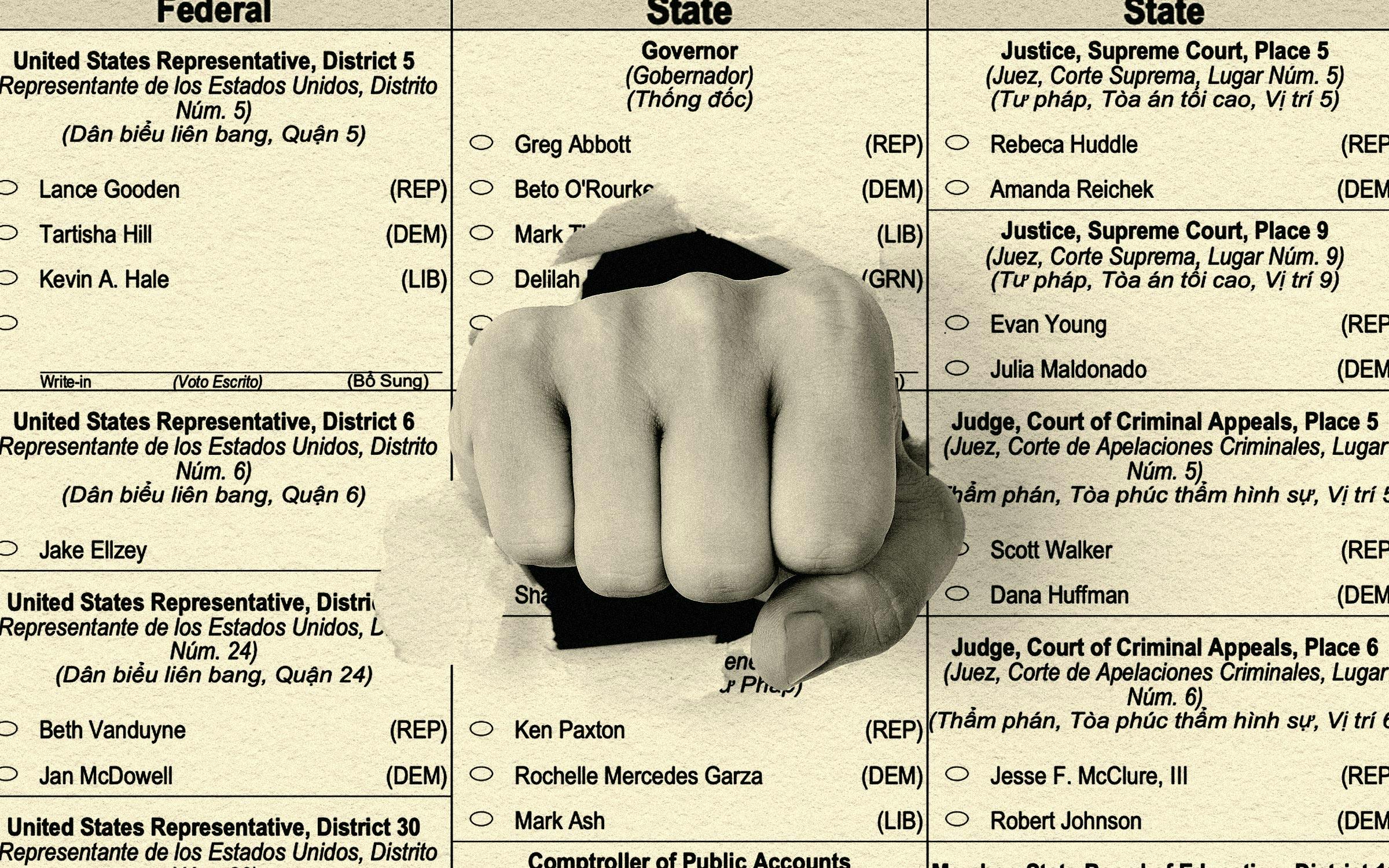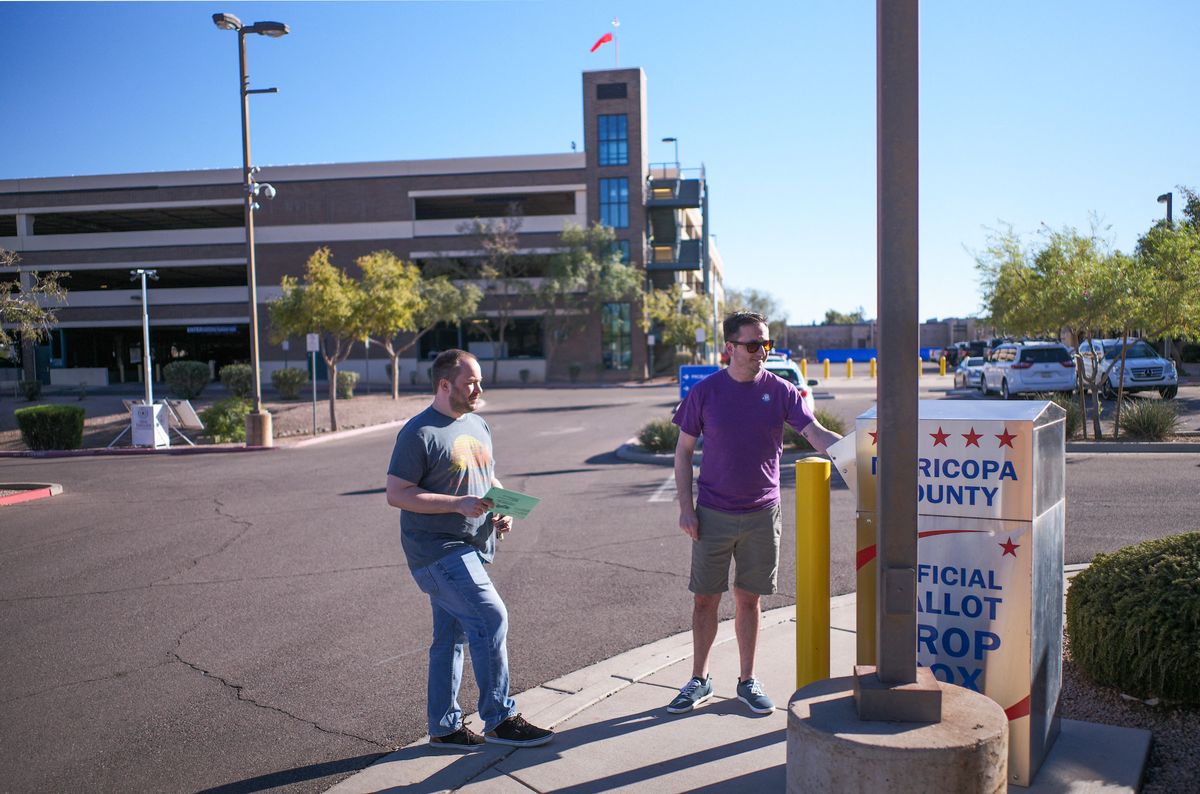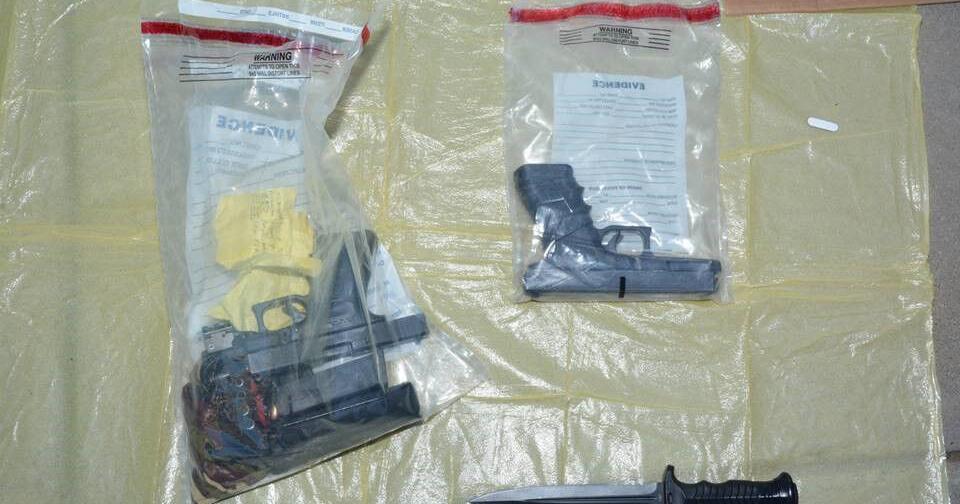
Inside the Movement to Root Out Nonexistent Election Fraud in Texas
Weston Martinez can’t provide evidence for his claims of fraud in the 2020 election, but he is drawing crowds of right-wing activists across Texas.
When Mellisa Brown took the stage at an event for “patriot” poll watchers in North Texas early in October, she had just lost a lawsuit challenging the election results in her hometown, Killeen. Earlier this year, Brown ran for reelection to the city council of the town, an hour north of Austin, and lost by 26 votes. Though she provided no evidence of fraud, she sued the opponent who won the seat, alleging county administrators had mismanaged the election and demanding the results be “declared void and a new election ordered by the court.” The court sided with her opponent and ruled that Brown had to pay $7,500 as a “sanction” for her frivolous suit. But the few dozen right-wing activists who’d gathered in Midlothian, a small city south of Dallas, celebrated her as a winner.
For nearly an hour, Brown described in detail how she had requested, compiled, and analyzed voter reports, voter lists, and data from the Secretary of State’s office. She argued there were inconsistencies and unexplained errors that suggested fraud in her race. And she patted herself on the back for her plucky efforts to seek relief. “I’ve learned how to write like the best attorney in the country,” Brown, who represented herself in court, said. “The great thing about the law is you get to copy everyone else. You don’t have to come up with your own original anything.”
The folks in the audience, who paid $25 a ticket to attend the event, applauded and sought, in turn, to follow Brown’s lead. The event host, a local right-wing activist group, promised to add Brown’s election-fraud “research” and approach, which they dubbed the “Mellisa Brown method,” to their upcoming training sessions for poll watchers and others seeking to promote “election integrity.” One speaker recommended that the audience study another set of trainings by Laura Pressley, an election denier whose allies filed a lawsuit challenging the results of a failed 2019 anti-fluoride ballot measure in Fredericksburg that was defeated in court in early October.
The audience, who had been promised barbecue on event fliers, instead enjoyed pizza and drinks as activists and organizers presented their research on alleged election fraud for hours. Finally, around 7:30 p.m., the headlining speakers took their seats for a roundtable discussion. The event’s main draw was one of Texas’s preeminent deniers of the 2020 election results, Weston Martinez, a longtime Republican activist from San Antonio who unsuccessfully ran for Texas land commissioner earlier this year. Martinez was joined on stage by Jameson Ellis, a failed Republican congressional primary candidate in Houston who’d challenged U.S. representative Dan Crenshaw, and Seth Keshel, a retired U.S. Army captain who said he’d collaborated with disgraced Army lieutenant general and QAnon conspiracy peddler Michael Flynn on “research” regarding election fraud in 2020.
Martinez began by thanking participants in the January 6 attack on the U.S. Capitol for “their service,” then told the audience that election fraud is not limited to the state’s blue counties, which he referred to as “Sodom and Gomorrah.” In Martinez’s telling, both Democrats and RINOs (Republicans in name only) are throwing elections, and only God-fearing patriots can prevent our electoral system from being corrupted by traitorous elements. “It’s not Republicans and Democrats,” he said. “It’s patriots and traitors.”
The plan Martinez outlined for activists in Midlothian was to get involved as poll watchers, election judges, or amateur election-fraud investigators ahead of the November 8 general election. Martinez also told me he’s pushing for changes to state law that would allow sheriffs to appoint “election investigators” who would have the ability to tell the federal government to “get the hell out” if officials tried to “sequester a voting location.” (Martinez did not specify exactly which agency of the federal government he was referring to or under what jurisdiction it would have the right to sequester a voting location or confiscate voting equipment—ironically, something that President Donald Trump reportedly directed his lawyers to do in key swing states.) Keshel, meanwhile, encouraged his followers to organize “drop box tailgate parties,” where they would stand guard at mail-in ballot delivery sites.
“Some people have gone home and said, ‘We’re not going to continue to do this because we’ve tried for two years and nobody’s put Trump back in office,’ and they failed to recognize that the damage done at the top of the ticket goes all the way down,” Keshel said gravely. “Complacency is the enemy of liberty. What that means is for the thirty or so folks that are here. We have thirty bullets that we can throw out there, not literally, but metaphorically . . . so what that means is all the people you’ve heard today, take a cue from them.”
Though widespread voter fraud has never been proven in an election in this century, the rhetoric of the movement alleging such fraud is not just bluster. Despite the GOP winning every statewide race in Texas in 2020, the state has become an epicenter of efforts to root out what many Republicans regard, or pretend to regard, as efforts to steal elections. Activists have already derailed standard election-equipment tests conducted by administrators by heckling them with conspiracy theories. Facing unprecedented threats and harassment, around a third of Texas election administrators have quit in the past two years.
While activists speak as if they are on the fringe—Keshel claimed he had been “shadow banned” from social media platforms in the state—they’ve made significant inroads with mainstream Texas Republican politicians. In April, Texas attorney general Ken Paxton gave an address in Houston at an “election integrity” gala to an audience of election-fraud conspiracy theorists, including Martinez. Multiple high-level Texas Republican officials have either hosted screenings or remarked positively about the widely debunked election-fraud conspiracy documentary, 2000 Mules, over the last several months. Two of the key figures in the film were recently jailed for contempt of court after refusing to name the key source of their wild election-fraud claims.
While barnstorming, Martinez has also suggested he’s in close contact with John Scott, Texas’s Secretary of State, who will oversee the November election. At a recent event in McKinney, Martinez claimed that he’d had a “private meeting” with Scott in September to discuss election fraud. Officials in the Secretary of State’s office deny such a meeting occurred but acknowledge Scott engaged with Martinez at a public event. “Weston Martinez came to a public press conference on September 20th in Austin and spoke to the Secretary there,” wrote assistant secretary of state for communications Sam Taylor in an email to Texas Monthly. “There were journalists and members of the public in the room.”
When it comes to providing evidence of the fraud of which he speaks so confidently, or even explaining how it might work, Martinez often struggles. At the event in McKinney, Martinez claimed that there had been fraud in dozens of counties, and he estimated that between 275,000 and 375,000 votes in Bexar County, home to San Antonio, were fraudulent. None of his numbers are rooted in meaningful statistical analysis; the Bexar County claim is a wild extrapolation from a highly publicized incident of alleged voter fraud that some on the right wing say involved thousands of votes.
Martinez said that large-scale cheating primarily involves the rigging of voting machines, a revelation he claims was found in analyses of the 2018 and 2020 primary elections, though the report he provided did not support the scope of his claims. He tried to explain how fraud occurs through a series of convoluted analogies that left some in the McKinney crowd confused. Citing primary-election numbers, he claimed that results were too consistent across races, comparing the phenomenon to the unlikelihood of catching fourteen different fish that were all nearly identical in weight, and suggesting that the consistency was evidence of fraud.
When an older woman in the audience asked Martinez to explain the metaphor, he instead tried his hand at three new ones, including one comparing voting machines to a scale at a butcher’s shop rigged to always measure a pound of meat, even if a slice is actually a quarter pound light or heavy in either direction. A man in the audience piped up dejectedly and reasoned that there wasn’t much point in getting involved: if results could be changed as easily as Martinez had suggested, he asked, what could he even do to help?

Judge Curbs Actions of Election-Monitoring Group in Arizona (Published 2022)
The group may not take photos or videos of voters, openly carry firearms near ballot boxes, or post information about voters online, a federal judge ruled.
A federal judge in Arizona has sharply curtailed the activities of an election-monitoring group in the vicinity of ballot boxes, including taking photos or videos of voters, openly carrying firearms, posting information about voters online, or spreading falsehoods about election laws.
The group, Clean Elections USA, has the stated goal of preventing voter fraud by staking out ballot boxes to ensure that people don’t behave as “mules” by illegally casting multiple ballots. In recent weeks, self-described “mule watchers” — some armed — have gathered around outdoor ballot boxes in Maricopa County to take pictures of voters and, in some cases, post those images online.
Last week, the League of Women Voters sued the group, saying that its actions amounted to “time-tested methods of voter intimidation,” and seeking an injunction to halt its activities. Early on Tuesday before a hearing on the matter, Clean Elections USA said it had agreed to cease some activities, including refraining from openly carrying guns or wearing visible body armor within 250 feet of ballot boxes, as well as following or interacting with voters within 75 feet of the boxes.
But the temporary restraining order issued by Judge Michael T. Liburdi, who was appointed by former President Donald J. Trump, goes well beyond that agreement, prohibiting the group “and other persons in active concert or participation with” it from taking photos or videos of voters or disseminating information about voters online, and also from “making false statements” about Arizona’s statutes regarding early voting in interviews or on social media. Lawyers for Clean Elections USA had resisted those limits, claiming they impinged on the group’s First Amendment rights and, in the case of comments made by its founder, Melody Jennings, would amount to unconstitutional prior restraint.
“It is imperative we balance the defendants’ right to engage in First Amendment-protected activity with the plaintiffs’ right to act without intimidation or harassment,” said Judge Liburdi after a marathon hearing in Phoenix punctuated by testimony from a Mesa, Ariz., man who said he and his wife were menaced when they went to vote last month.
According to the man, who testified without revealing his name publicly for fear of harassment, eight to 10 people filmed the couple and told them they were “hunting mules.” Images of him and his car were posted online and Ms. Jennings subsequently appeared on the podcast of Stephen K. Bannon, the former Trump adviser, saying they had caught a mule and “blasted it out viral.”
Judge Liburdi called his experience particularly compelling, and noted that it went well beyond testimony from last week in a parallel case against Clean Elections USA. In that lawsuit, brought by the Arizona Alliance for Retired Americans and Voto Latino, the judge declined to enjoin Clean Elections USA’s activities, saying he had not seen any evidence that real harm had befallen any voters. That ruling is being appealed in the Ninth Circuit.
In his concluding remarks on Tuesday, Judge Liburdi pointed to incorrect statements made by Ms. Jennings in posts on social media and in interviews that only spouses could return ballots on behalf of voters in Arizona, when in fact housemates and caregivers are legally permitted to do so in the state.
“This does not prohibit Miss Jennings from correctly stating what the law is,” said Judge Liburdi, noting that he would also draft a preliminary injunction against Clean Elections USA in coming days. “I just have a problem with her stating it incorrectly in a way that is intimidating or coercive to voting behavior.”
On Monday, the Justice Department filed a brief on the issue, noting that while it had no opinion on the lawsuit itself, the Constitution does not protect voter intimidation and that harassing or trying to harass people casting ballots could violate the Voting Rights Act of 1965. Underscoring the urgency of the moment, lawyers for the League of Women Voters noted that Tuesday was the last day to mail in early ballots under Arizona statute, making ballot boxes the only option for people who wish to vote before Election Day.

Tuesday was the last day to mail in early ballots in Arizona, making ballot boxes the only option for people who wish to vote before Election Day.Credit...Rebecca Noble for The New York Times
Alexander Kolodin, a lawyer who represents both Clean Elections USA and Ms. Jennings, said in court that he would most likely appeal the latest ruling. Although Clean Elections USA had voluntarily agreed to the restrictions on weapons, as well as on talking to, yelling at, or otherwise confronting or following voters, he argued that the restrictions on photography, online posting and discussing Arizona voting laws infringed on free speech.
Mr. Kolodin noted that a substantial press contingent had begun gathering near ballot boxes in Maricopa County over the past few weeks and that they had posted photos and videos of voters. “The Washington Post is intimidating voters,” he said.
With that in mind, he told the judge his clients were unfairly being singled out. “It seems like our clients are on trial for the entire state or anybody who wants to participate in ballot box monitoring or even share their views,” Mr. Kolodin said.
At the heart of those views is the false belief that illegal votes cast at drop boxes were responsible for President Donald J. Trump’s defeat in the 2020 elections, a theory espoused in the discredited conspiracy-laden documentary “2000 Mules.”
Ms. Jennings, in podcast interviews, has said she was inspired by a “teaser” for the movie that was released last spring. By the time “2000 Mules” was released in May, she had already built a significant following on the social network Truth Social based on her proposal to station observers at ballot boxes around the country. She has said she is recruiting volunteers to watch ballot boxes in every state, but has not indicated where other monitors might be active.
A Christian pastor and counselor based in Tulsa, Okla., Ms. Jennings has criticized the media’s coverage of Clean Elections USA. In a Monday interview on “War Room,” Mr. Bannon’s show, she said she was “tired that nobody comes and asks what it’s about.” Ms. Jennings has not responded to multiple requests for comment from The New York Times.
Pinny Sheoran, president of the League of Women Voters of Arizona, also provided sworn testimony at Tuesday’s hearing, describing how the activities of Clean Elections USA and similar groups had frightened her members, who feared they could be followed or even physically assaulted it they sought to deposit a ballot in a drop box. To address those concerns, the group had spent time and money aiming to educate Arizona voters that they had a legal right to vote, she said.
“Today’s U.S. District Court decision is a victory for the voters of Arizona who have the right to cast their ballots free from intimidation, threats or coercion,” she said in a statement after the hearing.



